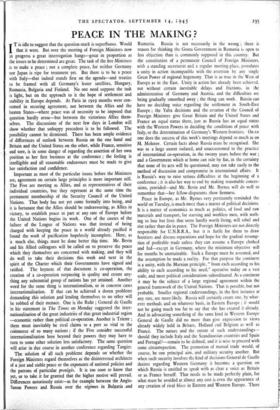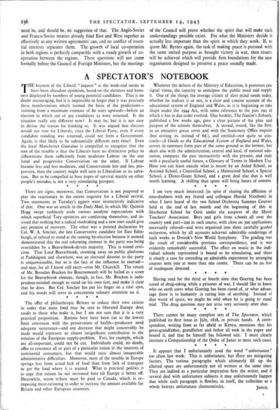PEACE IN THE MAKING?
IT is idle to suggest that the question-mark is superfluous. Would that it were. But over the meeting of Foreign Ministers now in progress a great interrogation hangs—great in proportion as the issues to be determined are great. The task of the five Ministers is to make a peace ; not a complete peace, for neither Germany nor japan is ripe for treatment yet. But there is to be a peace with Italy-2--that indeed stands first on the agenda—and treaties to be framed with all Germany's lesser satellites, Hungary, Rumania, Bulgaria and Finland. No one need suppose the task is light, but on the approach to it the hope of settlement and stability in Europe depends. At Paris in 1919 months were con- sumed in securing agreement, not between the Allies and the beaten States—where peace was of necessity to be imposed that question hardly arose—but between the victorious Allies them- selves. The discussions of the next few days in London will show whether that unhappy precedent is to be followed. The possibility cannot be dismissed. There has been ample evidence of differences of outlook between Russia on the one hand and Britain and the United States on the other, while France, sensitive and sore, is in some danger of regarding the assertion of her own position as her first business at the conference ; the feeling is intelligible and all reasonable endeavours must be made to give her satisfaction and confidence.
Important as most of the particular issues before the Ministers are, agreement on certain large principles is more important still. The Five are meeting as Allies, and as representatives of their individual countries, but they represent at the same time the permanent membership of the Security Council of the United Nations. That body has not yet come formally into being, and it is fortunate that the Allies should be endeavouring, as Allies in victory, to establish peace in part at any. rate of Europe before the United Nations begins its work. One of the causes of the failure of the League of Nations was that instead of being charged with keeping the peace in a world already pacified it found the work of pacification hopelessly incomplete. Here, as ii much else, things must be done better this time. Mr. Bevin and his Allied colleagues will be called on to preserve the peace which they themselves are concerned with making, and they will do well to take their decisions this week and next in the spirit of the Charter which their Governments have signed and ratified. The keynote of that document is co-operation, the creation of a co-operation surpassing in quality and extent any- thing any substantial group of nations has yet attained. Another word for the same thing is internationalism, or in concrete cases internationalisation. If that can be achieved a dozen problems demanding this solution pnd lending themselves to no other will be robbed of their menace. One is the Ruhr ; General de Gaulle in his statement in The Times on Monday suggested the inter- nationalisation of the great industries of that great industrial region —economic rather than political co-operation. Another is Trieste ; there must inevitably be rival claims to a port so vital to the coMmerce of so many nations ; if the Five considtr successful internationalisation here beyond their powers they may have to turn to some other solution less satisfactory. The same question will arise in due course in another conference regarding Tangier.
The solution of all such problems depends on whether the Foreign Ministers regard themselves as the disinterested architects of a just and stable peace or the exponents of national policies and the patrons of particular protégés. It is too soon to know that yet, or to take it for granted that the higher motive will prevail. Differences notoriously exist—as for example between the Anglo- Saxon Powers and Russia over the regimes in Bulgaria and Rumania. Russia is not necessarily in the wrong ; there is reason for thinking the Groza Government in Rumania is open to less objection than is commonly supposed in this country. But the constitution of a permanent Council of Foreign Ministers, with a standing secretariat and a regular meeting-place, postulates a unity in action incompatible with the assertion by any single Great Power of regional hegemony. That is as true in the West of Europe as in the East. Unity in action has already been achieved, not without certain inevitable delays and frictions, in the administration of Germany and Austria, and the difficulties are being gradually smoothed away ; the thing can work. Russia can have no deciding voice regarding the settlement in South-East Europe ; the Yalta decisions and the creation of the Council of Foreign Ministers give Great Britain and the United States and France an equal status there, just as Russia has an equal status with the Western Powers in deciding the conditions of peace with Italy, or the determination of Germany's Western frontiers. On no one does the success of this week's meetings depend so much as on M. Molotov. Certain facts about Russia must be recognised. She was to a large extent isolated, and unaccustomed to the practice of internatidnal co-operation, in the twenty years before the war ; and a Government which at home can rule by fiat, in the certainty that none of its' acts will be questioned, may not take easily to the method of discussion and compromise in international affairs. It is Russia's way to raise serious difficulties at the beginning of a conference ; it is also her way to end by making reasonable conces- sions, provided—and Mr. Bevin and Mr. Byrnes will do well to remember that—her fellow-disputants show firmness.
Peace in Europe, as Mr. Byrnes very pertinently reminded the world on Tuesday, is much more than a matter of political decisions. It is a matter of economics as much as politics, of food and raw materials and transport, for starving and workless men, with noth- ing to lose but lives that seem hardly worth living, will rebel and riot rather than die in peace. The Foreign Ministers are not directly responsible for U.N.R.R.A., but it is futile for them to draw frontiers and discuss reparations and hope for the gradual resump- tion of profitable trade unless they can assume a Europe clothed and fed—except in Germany, where the minimum objective will for months be unattainable. Such a Europe must be assumed, and the assumption be made a reality. For that purpose the continent is a unity, with the Marxian principle, "from each according to his ability to each according to his need," operative today on a vast scale, and most political considerations subordinated. As a continent it may be the subject of a large regional agreement within the general framework of the United Nations. That is possible, but not probable. Smaller regional understandings, in the first instance at any rate, are more likely. Russia will certainly create one, by what- ever methods and on whatever basis, in Eastern Europe ; it would not be going much too far to say that she has created it already. And in advocating something of the same kind in Western Europe General de Gaulle did no more than give expression to views already widely held in Britain, Holland znd Belgium as well as France. The nature and the extent of such understandings— should they include Italy and the Scandinavian countries and Spain and Portugal?—remain to be defined, and it is wise to proceed with some circumspection. The promotion of mutual trade would, of course, be one principal aim, and military security another. But when such security involves the kind of decisions General dc Gaulle desires regarding Western Germany it becomes a question on which Russia is entitled to speak with as clear a voice as Britain or as. France herself. That needs to be made perfectly plain, for what must be avoided at almost any cost is even the appearance of any creation of rival blocs in Eastern and Western Europe. There need be, and should be, no suggestion of that. The Anglo-Soviet and Franco-Soviet treaties already bind East and West together as effectively as any written agreements' can, and no conflict of essen- tial interests separates them. The growth of local co-operation in both regions is perfectly compatible with a steady growth of co- operation between the regions. These questions will not come formally before the Council of Foreign Ministers, but the meetings of the Council will prove whether the spirit that will make such understandings possible exists. For what the Ministers decide is actually less important than the spirit in which they work. If, to quote Mr. Byrnes again, the task of making peace is pursued with the same united purpose as brought victory in war, then results will be achieved which will provide firm foundations for the new organisation designed to preserve a peace soundly Made.



























 Previous page
Previous page